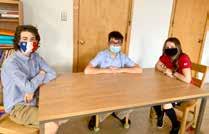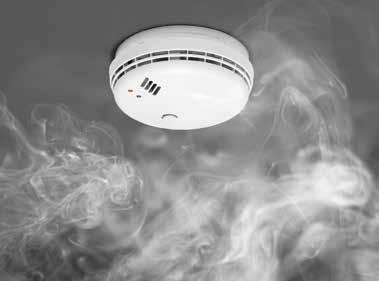
2 minute read
PROTECTING SENIORS THROUGH PREVENTION
There’s no question that the pandemic has turned our lives upside down. Infectious diseases remain a major part of our everyday lives, and they’re a serious risk that we need to manage. Seniors have been hit particularly hard, especially by preventive measures like isolation. By definition, prevention is any action designed to stop people from getting sick by establishing therapeutic tools, hygiene measures, and precautions. (Encyclopedia of Medicine & Health, 2001 p. 1096). Anticipation is also part of prevention. In public health, anticipation can be divided into three stages: primary, secondary, and tertiary prevention.1
Primary prevention involves promoting ways to stop a disease from spreading through a population. This stage can also involve more specific measures, like vaccinations, for people who are more at risk. As for secondary prevention, it involves establishing screening measures to detect the disease early and anticipate its progression. Finally, tertiary prevention aims to limit the risks of complications and relapse or reoccurrence. In seniors, the goal is to increase life expectancy, but also to maintain quality of life for as long as possible. Ideally, the best way to do this would be to extend preventive practices to all seniors. However, currently only people with chronic medical conditions appear to have regular follow-up and monitoring.2
While we wait for medical vaccines to be developed, “social vaccines” (like raising awareness through information, education, and communication of correct information and health measures) are the best way of working with seniors and keeping them safe.
Matey Mandza M.D., Ph. D., LL. M. Researcher (Drummondville CCEG) Vice-President of the Association québécoise de gérontologie (AQG)
References - Tapiéro, Bruce and Carle, Marie-Ève (2009).
Les maladies infectieuses. L’illusion du risque zéro.
Published by the CHU Sainte-Justine. Chemin de la
Côte-Sainte-Catherine, Montréal, 22p. - Mandza, M. (2020). Un vaccin social pour et avec les aînés - Covid-19. Accessed online: CCEG Publication at https://youtu.be/DChaHgVEu_I 1. Arcand, M., and Hébert, R. (2007). Précis pratique de gériatrie, 3e édition. Edisem Inc. Sylva Clapin, Saint-
Hyacinthe, Québec. 1270p. 2. Arcand, M., et Hébert, R. (2007). Précis pratique de gériatrie, 3e édition. Edisem Inc. Sylva Clapin, St.
Hyacinthe, Québec. 1270p.
DON’T STAY ALONE aqrp.ca JOIN US!
Proud partner of Lobe
Why become an AQRP member?
• Enjoy social and physical activities • Have access to conferences, training, web conferences, contests and blog • Benefit from a host of savings and advantages at Lobe,
La Capitale insurances and many important partners (health, leisure, culture, travel, etc.) • Promote your rights and have access to a free telephone help service!

1 800 653-2747 www.aqrp.ca
AQRP members receive a 20%* discount on a complete hearing assessment performed by an audiologist practicing in a Lobe clinic.
* Discount offered by Michèle Veilleux, audiologiste audiology services. Applicable only on a complete hearing assessment ($75 value) performed by an audiologist practicing in a Lobe clinic, excluding pediatric hearing assessments and other services. By appointment only. Cannot be combined with any other promotion. Call 1 866 411-5623 to find the nearest Lobe clinic. Offer available until December 31, 2021. Some conditions apply.










